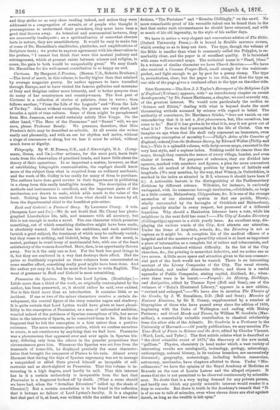Pausanias the Spartan. By the late Lord Lytton. (Routledge.)— Little
more than a third of the work, as originally contemplated by the author, has been preserved, or, it should rather be said, ever existed. Nor is this third more than an introduction. It contains little or no incident. If one or two of the minor characters receive a certain de- velopment, the central figure of the story remains vague and shadowy. It is quite certain that Lord Lytton would have given at least plausi- bility to his conception of Pausanias, as a man of unbounded ambition, wearied indeed of the pettiness of Spartan conceptions of life, but never false to the interests of Sparta, as he conceived thorn to be. But in the fragment that he loft the conception is a hint rather than a positive existence. The more common-place notion, which we confess ourselves to retain, is not overthrown by anything that we find here. Pausanias was a phenomenon that appeared over and over again in Spartan his- tory, differing only from the others in the grander proportions that circumstances gave him. Whenever the Spartan was sot free from the trammels of home-life, he displayed precisely the same character- istics that brought the conqueror of Platma to his rain. Almost every Harmost that during the days of Spartan supremacy was set to manage a vanquished or allied State proved himself as incapable of self- restraint and as short-sighted as Pansanias. That this volume is in- teresting in a high degree, need hardly be said. That this interest has in it a certain melancholy is inseparable from the fact that Pausanias is a fragment broken off by death. (What a scene should we have bad, when the "Arcadian Evocators" called up the shade of Cleonice 0 But a certain consolation is to be found in the reflection that it betrays no failure of Lord Lytton's faculty. It is a singular fact that part of it, at least, was written while the author had two other fictions, "The Parisians" and "Benelm Chillingly," on the anvil. No more remarkable proof of his versatile talent can be found than in the fact that under such circumstances he should have returned, and with so much of his old ingenuity, to the style of his earlier days.


































 Previous page
Previous page